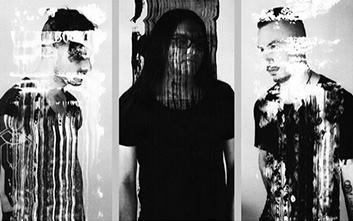A fair few weeks ago I let erryone know about The Black Queen, an upcoming supergroup-ish project featuring Greg Puciato from Dillinger Escape Plan, Joshua Eustis (Telefon,Tel Aviv) and their mate Steven Alexander. Back then there were only three songs; now there’s eight more and they’ve crammed ten of them into their first album Fever Daydream. True to early promises, Fever Daydream is almost a fan-fiction concerning 80s electronica.

We got a taste of them last year, and now 2016 looks to begin the proper reign of The Black Queen following the release of their debut album Fever Daydream.
The Black Queen have shoehorned in a range of influences under a rather cumbersome umbrella that stretches from synth-pop on the left to dark industrial music on the right, with specks of new wave somewhere in the middle. The first two songs are emblematic of this: Ice to Never, still the groovy synth-pop banger it was the first time it was brought up, (awkwardly) transitions into the rather more gloomy The End Where We Start.
The album never really returns to the accessible, poppy heights of Ice to Never. It falls away into a blackness similar to its cover artwork. At times it certainly feels a bit bleak, as the band goes for a swim in the same neo-noir lake that Depeche Mode spent their holidays in. Tracks like That Death Cannot Touch, Secret Scream and Distanced seem ripped straight out of the British synth-pop pioneers’ textbook, heavy and dark beats that seek to break the accessibility ceiling (Secret Scream does this a lot better, hence its higher track listing) from inside their glass house of gloom.
The sense of foreboding electronica probably has a lot to do with the period; the 1980s was when digital technology first began to enter the public consciousness; case in point, electronic music became popular. Buried with the deeply anti-utopian heyday of postmodernism (what is truth? etc etc), the advent of huge technological change seems to have caused rather dystopian fears about the future. (I am basing this thought bubble off the aesthetics and themes of the movie Blade Runner, but I’m probably close to the truth anyway.)
Yet for all the 80sness, there is a strong modern streak within Fever Daydream. The production is, obviously, far crisper than music of the time period, and time and again licks of modern electronica infiltrate the songs. Strange Quirk and Now, When I’m This stand out with their scratching ambience; That Death Cannot Touch sounds very 80s (and almost like the cool orchestra / synth-pop song from The Fifth Element), but has modern tips on its crest as well as featuring a very digital deconstruction; and then there’s Distanced, which shares common ground with The xx’s Crystallised in its shadow boxing pop.
Puciato’s vocals seamlessly fits in with every track, with his Chet Faker-meets-Trent Reznor testiculating croon. In many ways, something like Fever Daydream perfectly meets his abilities. Thinking back to his day job, Dillinger, it’s interesting to note that they haven’t experimented with electronica since their third album Ire Works (which resulted in this ridiculously genius grindcore/Radiohead/R&B mashup). Perhaps Puciato has found his Fever Daydream isn’t a mind-bending; there’s a few good tracks, most importantly Ice to Never. LISTEN TO IT ALREADY!
It’s neatly composed – the band members’ expertise is clear in the crispness of the songwriting – but it never throws a slow bouncer that gets the blood pumping or a yorker that blows the bails off the heart, except for maybe the obvious track Maybe We Should and Distanced. In other words, it’s at least good enough to give its best songs a healthy spin on triple J. If Ice to Never ever got a spin, it’d go straight to the top. Way better than that Rubens crap anyway…



